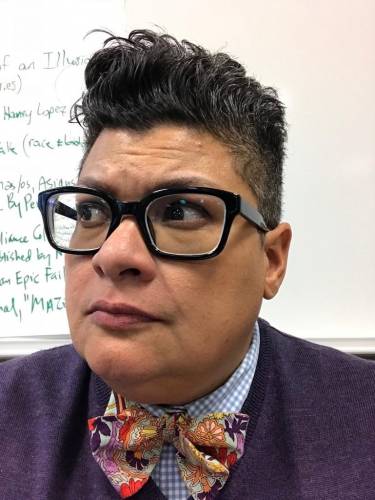Making peace by disrupting systematic racism
The problem with purity
Rev. Jessica Vazquez Torres
Psalm 15:1-3 (CEB)
Who can live in your tent, Lord? Who can dwell on your holy mountain? The person who … does no damage with their talk,
does no harm to a friend, doesn’t insult a neighbor.
Reflection: For a country purporting to be a melting pot, the United States is deeply invested in the invented notion of ‘purity.’ From the ‘One Drop Rule’ used to decide who is black to the blood quantum policy used to determine who counts as Native American, the question of who is good enough, pure enough, and white enough to join our experiment continues today.
Our nation claims to welcome all, but full welcome is primarily reserved for those who are white, straight, Christian, able-bodied, healthy, educated, and believers in the projects of whiteness and capitalism. Those who colonized our nation centuries ago invested in the mythology that declares the United States a ‘City on a Hill,’ a new Jerusalem for God’s new chosen people. Yet we conveniently forget God’s commands. We ignore the psalmist’s call to a social fabric founded on truth and a commitment to do no harm. Our government engages in practices that normalize violence and punish the poor, while bending over backwards for the wealthy. We internalize the twisted logic central to white dominance, confusing integrity with purity and responsibility with perfection.
If only the blameless could enter God’s holy place, none of us would qualify. Instead, we are called to live with integrity, taking responsibility for the ways we treat our siblings and creation.
Action: Pick up your phone and call your representatives (are they on speed-dial yet?). Demand an end to policies that detain and incarcerate children, whether in detention centers or jails. Push for the dismantling of a prison industrial complex so racially biased that it disproportionately destroys the lives of people of color. Call for an immigration policy that treats immigrants not as criminals but as beloved children of God.
Prayer: Who can live in your tent, Lord? Who can dwell on your holy mountain? God, dismantle our desire to accept only those like us. Guard against the ways our love for those like us causes us to stumble into maintaining exclusionary communal practices that harm our siblings. Remind us of your call to live with integrity and your assurance that you will keep us grounded on the journey. Amen.

Rev. Vazquez Torres works in antiracism, anti-oppression and cultural competency. A 1.5-Generation ESL Queer Latina of Puerto Rican descent, s holds a BA in Criminal Justice, an MDiv from Christian Theological Seminary, and an MTS from the Candler School of Theology at Emory University. When not on a plane, she attempts to become a bread baker, cultivates community with her spouse, Laura, and sings songs badly with full abandon.
This year’s A Season of Peace Resources are designed to help Presbyterians explore different forms and lenses for peacemaking. From the personal level to global issues, these reflections and prayers will help grow the faith and witness of the whole church. Through the 29 days of this year’s Season of Peace, we are invited to reflect upon:

- What does it mean to commit to Peace?
- Making peace by addressing root causes of poverty
- Making peace by disrupting systematic racism
- Making peace by ending violence
- Making peace by supporting refugees and migrants
- Partaking in peace in worship and at table this World Communion Sunday and through the Peace & Global Witness Offering
Each author represents a variety of vocations and experiences in peacemaking efforts. Individuals and households are invited to make use of these daily reflections beginning on Sunday, September 1, and concluding on World Communion Sunday, October 6.